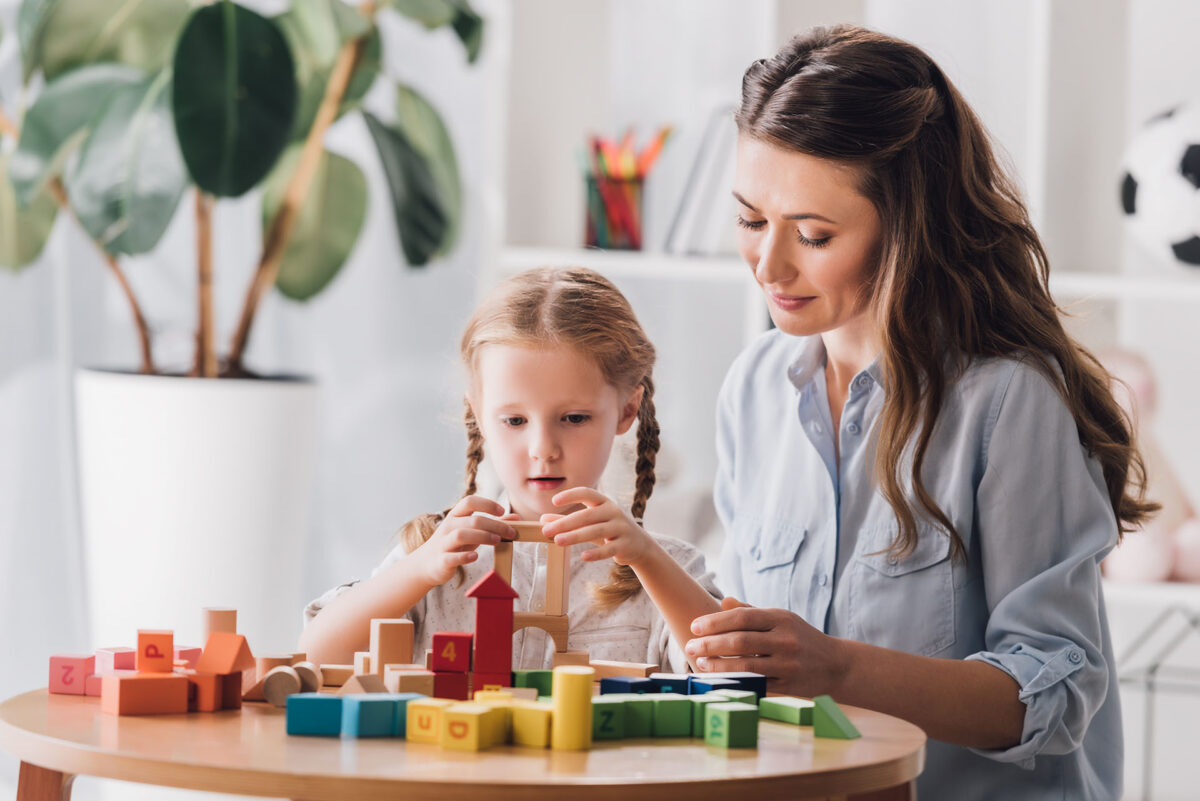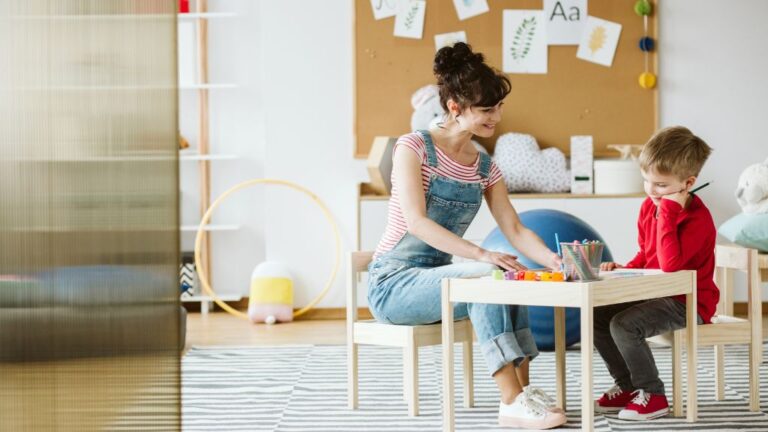The impact of ABA therapy on autism care is truly transformative for families, leading to remarkable improvements in communication skills, behavior, and learning abilities. Globally recognized as the gold standard in the industry, ABA therapy garners support from extensive scientific research. Its benefits extend beyond clients’ lives, positively influencing entire families. At Texas ABA Centers, we provide in-home ABA therapy to enhance your child’s life and help them reach their fullest potential. Read on to explore why in-home ABA therapy may be ideal for your child and family.
As a parent with a child on the autism spectrum, you constantly strive to maximize your child’s potential and nurture their unique abilities. One-on-one ABA sessions in the comfort of your home offer a remarkable opportunity to achieve this comprehensive care. Known as Applied Behavior Analysis (ABA), this approach provides individualized observation, expert guidance, and tailored instruction to help children with autism reach their fullest developmental potential. By embracing in-home ABA therapy, you create an environment where your child feels confident and empowered to flourish.
In-Home ABA Therapy in Texas: What Are the Benefits?
In-home ABA therapy provides numerous benefits that can significantly contribute to a child’s progress. One key advantage is that individualized care focuses on tailored interventions within your child’s familiar environment. A Board Certified Behavior Analyst (BCBA) designs ABA plans specifically for your child, considering their unique development and adjusting the pace as necessary. This adaptability ensures that the child receives support precisely where they need it most, accommodating their evolving needs and facilitating optimal progress.
In-home ABA sessions offer families convenience and accessibility that can greatly enhance the therapy experience. By bringing ABA practitioners directly to the home, you avoid long and costly commutes and scheduling hassles that often accompany off-site therapy. In-home sessions result in fewer cancellations and more quality time dedicated to therapy, maximizing the effectiveness of the sessions.
In terms of comfort, a child’s home carries a sense of familial power and familiarity. The comfort and security of their personal space can profoundly impact home sessions. Parents can feel confident that their child is progressing in a safe and welcoming environment, and they also have more opportunities to learn and understand the principles of ABA themselves, fostering a collaborative and empowering approach.
Another benefit is the consistent routine and positive reinforcement offered by in-home ABA therapy. While it requires effort and dedication, the independence a child can attain through in-home sessions can hold greater significance. These sessions go beyond behaviors within the home, effectively addressing behaviors relevant to school and other structured social settings.
In-Home ABA Therapy in Texas: What Should You Expect?
During in-home ABA therapy sessions, a Registered Behavior Technician (RBT) works with your child individually during allotted treatment hours to teach them various developmental skills. These skills follow suit with a personalized plan provided by a BCBA, which targets your child’s unique goals, whether improving social skills or avoiding complicating behaviors.
RBTs interact with clients in numerous ways and may include games, activities, and rewards (reinforcers) in their sessions to keep your child motivated. These technicians also offer parent training and supportive guidance so caregivers can implement these useful skills even in a provider’s absence.
In-Home ABA Therapy in Texas: What Does a Standard Session Look Like?
Very rarely, if ever, are two in-home ABA therapy sessions the same. Each RBT and BCBA has a unique style to keep sessions engaging and fresh. Some utilize a more energetic style, while others use a softer and calmer approach. High-caliber professionals determine their tone based on the child’s needs and progress.
During an in-home session, the practitioner will review session goals and progress from previous appointments. Then they will engage with your child to warm them to the session. Following this warm-up, they will begin hands-on interventions tailored to your child’s treatment plan. They may use discrete trial training, behavior chaining, and other natural environment methodologies. RBTs will also practice language acquisition and communication exercises to promote positive interactions.
Your practitioner may implement various ABA activities that practice and teach skills. These activities will typically look like games and occur naturally throughout the session. ABA exercises may include:
- Following instructions
- Learning about emotions
- Memorizing personal information like name, age, teacher, and parent’s phone numbers
- Recognizing facial expressions
- Understanding social cues
- Greetings, introductions, and goodbyes
- Establishing relationships and maintaining them
- Turn-taking exercises
- Completing tasks or behavior chains
- Practicing back-and-forth communication
- Exploring unfamiliar concepts, topics, and characters
Throughout the session, the RBT and BCBA will offer detailed feedback to you as a parent. Additionally, they will offer plenty of breaks and opportunities for play and free time. RBTs will also encourage children to develop at-home skill sets like teeth brushing and dressing.
In-Home ABA Therapy in Texas: Does Technology Enhance a Child’s Development?
While utilizing technology may not be the first thing parents think of during an in-home ABA session, it can be a powerful tool to enhance a child’s progress. Advanced apps can collect data while providing fun and engaging tactics therapists can use to manage data points and provide parents with critical feedback efficiently.
Educational games can also improve language, cognitive, and social development. While some parents aren’t super keen on utilizing screen time, technology can be highly motivating for a child on the spectrum when implemented correctly. It’s important to be open about technology and how it can complement your child’s sessions to enhance their life without creating dependence.
How Can You Make the Most of Your In-Home ABA Therapy Sessions?
In-home ABA therapy works best when you prepare your home to be as comfortable and productive for learning as possible; this will help your child feel more at ease and more inclined to receive feedback from RBTs.
Making the most of your in-home ABA sessions starts with ridding the home of distractions or clutter. Ensure all necessary materials are easily accessible and consider using visual aids or sensory items to assist in the session.
Ensuring that your RBT and BCBA are from an established ABA provider alleviates parents’ worry when beginning in-home sessions. Remember, these individuals have undergone extensive training and possess valuable knowledge regarding autism spectrum disorder. This knowledge allows them to identify core issues and tailor their treatment plans compassionately. They can provide insights and expertise that parents can use to help their child’s development further when they’re not in a session.
In-Home ABA Therapy with Texas ABA Centers
At Texas ABA Centers, we offer comprehensive in-home ABA therapy that provides various benefits you may not receive in a clinic. We aim to ensure families feel comfortable in their child’s development progress while focusing on unique skill sets to prepare them for the future more successfully.
Our experienced RBTs and BCBAs will provide your child with engaging sessions to keep them entertained and willing to embrace their true potential. They are well-versed in the methodologies implemented during in-home ABA therapy and will create long-lasting tools for your child.
Contact us at (877) 771-5725 to learn more about in-home ABA therapy or any additional questions regarding autism care for Texas.








